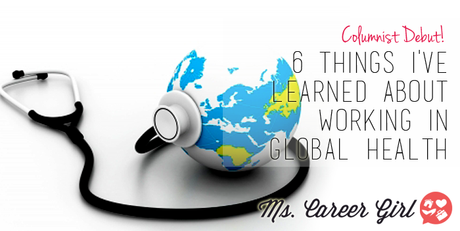
Our new columnist, Ankita, talks about her budding career in Global Health. Read her thoughts on its advantages, challenges, and the Ebola outbreak.
I graduated from college in May with a degree in Economics and a half-baked plan for my future. I knew that in two months’ time I would be moving to Washington D.C. to pursue to wonderful job in a field entirely new to me. Excitement? Nervousness? It’s hard to say exactly what I was feeling then and even harder to guess what my new job in global health would entail. But I expected it would be hectic and challenging‌and boy, was I right.
As a career baby, these past few months I’ve spent at my organization have been some of the most challenging and exhilarating months of my life. The six points below may or may not speak to your experience in global health, but I they certainly speak to mine!
1. You don’t know squat

2. There may be a lot of travel involved
Do you like to travel to remote, exotic locations? Perhaps you were eying the milky slopes of Switzerland or the scenic landscape of New Zealand. Wouldn’t it be great if you job could send you to these locations without a single additional penny flying from your wallet? Why yes, it would be great and if that’s something you want, pick a different career. Global health, in particular, my job involves building health systems in developing countries. So yes, there is a great deal of traveling but it’s importa nt to note the following:
- We travel to developing countries—this might mean Ghana, Kenya, Tanzania, Nigeria, or Jordan. Sometimes you might get to travel to Geneva for a global conference, but more often than not, this is rare.
- You might not even get to travel. There is almost no week when someone from my team isn’t traveling abroad. But as a junior member of my organization, I travel less frequently than many of my colleagues and certainly far less than does my boss. Therefore, if your organization has the ability to send you abroad, take that as a blessing—not a right.
3. You will be busy
I enjoy being busy. God knows it’s much better than the alternative—having nothing to do. So when I interviewed with the

I remember my father once complaining that his company, a large multinational Indian conglomerate with 8400+ employees, seldom trusts its new employees. He said new employees often undergo six months of training only to receive little or no work to do afterwards. I am sure a large reason for this disparity boils down to the fact that my organization is a) very new and b) much smaller. So ask yourself, what would you prefer? (Hint: No right or wrong answer)
4. You will meet some really “memorable” people

A few weeks ago, I attended two large events in succession. First, I attended the United Nations General Assembly in New York, followed by a large global health conference in Cape Town, South Africa. Both events lured the brightest and ambitious of the global health community. I had countless amusing encounters. In Cape Town alone, I met one man who subtleÂishly suggested I should get married before pursuing an advanced degree, another man who compared the Universal Health Coverage (UHC) online platform I work on to a simplified version of eHarmony, and yet another man from USAID who pulled out a red handkerchief and did a magic trick for me (very cool, but also very random).
5. Networking can be awkward

I’m proud to say, I have gotten much better at networking since that ill-fated encounter. It takes time and believe me, it’s hard to push the awkward out of me. But the more you do it, the more you get a hang of it. What I’ve learned works is attending as many networking events as possible and just exposing yourself to the opportunities. Also, always ask people about what they do—if there’s one thing I’ve noticed, it’s that older and experienced people love to talk about themselves.
6. Ebola is tough, but we are tougher
One of the things I’ve noticed is that working in global health in light of the recent Ebola outbreak has been really fascinating. Ebola is the central topic at just about any major conference you attend. But contrary to the common misconception, Ebola is preventable and certainly containable. I had a conversation with a friend the other day who conveyed her fear that the virus would soon mutate and become airborne. I’m no expert and I acknowledge the possibility that the virus might mutate, but I also find this to be highly unlikely‌as do the health specialists and doctors that I’ve met. What we need to do is build health systems, fix the gap between the low supply of workers and the high demand for workers, and governments must be accountable. There is still much to do but people… Ebola can be overcome!
Are you in a career in Global Health as well? Let us know what you think of it in the comments below or tweet us at @mscareergirl now!

